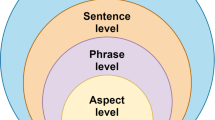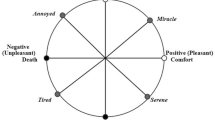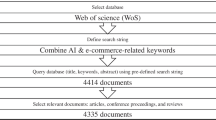Abstract
The last decade has seen a rapid growth in the volume of online reviews. A great deal of research has been done in the area of opinion mining, aiming at analyzing the sentiments expressed in those reviews towards products and services. Most of the such work focuses on mining opinions from a collection of reviews posted during a particular period, and does not consider the change in sentiments when the collection of reviews evolve over time. In this paper, we fill in this gap, and study the problem of developing adaptive sentiment analysis models for online reviews. Given the success of latent semantic modeling techniques, we propose two adaptive methods to capture the evolving sentiments. As a case study, we also investigate the possibility of using the extracted adaptive patterns for sales prediction. Our proposal is evaluated on an IMDB dataset consisting of reviews of selected movies and their box office revenues. Experimental results show that the adaptive methods can capture sentiment changes arising from newly available reviews, which helps greatly improve the prediction accuracy.
Similar content being viewed by others
References
Archak, N., Ghose, A., Ipeirotis, P.G.: Show me the money!: deriving the pricing power of product features by mining consumer reviews. In: KDD, pp. 56–65 (2007)
Basilico, J., Hofmann, T.: Unifying collaborative and content-based filtering. In: ICML, pp. 65–72 (2004)
Blei, D., Ng, A., Jordan, M.: Latent dirichlet allocation. J. Mach. Learn. Res. 3, 993–1022 (2003)
Boykin, S., Merlino, A.: Machine learning of event segmentation for news on demand. Commun. ACM 43(2), 35–41 (2000)
Chevalier, J.A., Mayzlin, D.: The effect of word of mouth on sales: online book reviews. J. Mark. Res. 43(3), 345–354 (2006)
Chien, J.-T., Wu, M.-S.: Adaptive bayesian latent semantic analysis. IEEE Trans. Audio Speech Lang. Processing 16(1), 198–207 (2008)
Dave, K., Lawrence, S., Pennock, D.M.: Mining the peanut gallery: opinion extraction and semantic classification of product reviews. In: WWW, pp. 519–528 (2003)
Dellarocas, C., Awad, N.F., Zhang, X.(Michael): Exploring the value of online reviews to organizations: implications for revenue forecasting and planning. In: ICIS, pp. 379–386 (2004)
Dellarocas, C., Zhang, X.(Michael), Awad, N.F.: Exploring the value of online product ratings in revenue forecasting: the case of motion pictures. J. Interact. Market 21(4), 23–45 (2007)
Enders, W.: Applied Econometric Time Series, 2nd edn. Wiley, New York (2004)
Forman, C., Ghose, A., Wiesenfeld, B.: Examining the relationship between reviews and sales: the role of reviewer identity disclosure in electronic markets. Inf. Syst. Res 19(3), 291–313 (2008); Special issue on the interplay between digital and social networks
Ghose, A., Ipeirotis, P.G.: Designing novel review ranking systems: predicting the usefulness and impact of reviews. In: ICEC, pp. 303–310 (2007)
Ghose, A., Ipeirotis, P.G.: Estimating the helpfulness and economic impact of product reviews: mining text and reviewer characteristics. IEEE Trans. Knowl. Data Eng. 23(10), 1498–1512 (2011)
Girolami, M., Kabán, A.: On an equivalence between plsi and lda. In: SIGIR ’03: Proceedings of the 26th Annual International ACM SIGIR Conference on Research and Development in Informaion Retrieval, pp. 433–434 (2003)
Grefenstette, G., Qu, Y., Shanahan, J.G., Evans, D.A.: Coupling niche browsers and affect analysis for an opinion mining application. In: Proceedings of RIAO-04, 7th International Conference on Recherche d’Information Assiste par Ordinateur, pp. 186–194 (2004)
Gruhl, D., Guha, R., Kumar, R., Novak, J., Tomkins, A.: The predictive power of online chatter. In: KDD ’05, pp. 78–87 (2005)
Gruhl, D., Guha, R., Liben-Nowell, D., Tomkins, A.: Information diffusion through blogspace. In: WWW ’04, pp. 491–501 (2004)
Hofmann, T.: Probabilistic latent semantic analysis. In: UAI’99, pp. 289–296 (1999)
Hofmann, T., Puzicha, J.: Latent class models for collaborative filtering. In: IJCAI, pp. 688–693 (1999)
Kamps, J., Marx, M.: Words with attitude. In: Proc. of the First International Conference on Global WordNet, pp. 332–341 (2002)
Liu, B., Hu, M., Cheng, J.: Opinion observer: analyzing and comparing opinions on the web. In: WWW, pp. 342–351 (2005)
Liu, Y., Huang, X., An, A.: Personalized recommendation with adaptive mixture of Markov models. J. Am. Soc. Inf. Sci. Technol. 58(12), 1851–1870 (2007)
Liu, Y., Huang, X., An, A., Yu, X.: ARSA: a sentiment-aware model for predicting sales performance using blogs. In: SIGIR, pp. 607–614 (2007)
Morinaga, S., Yamanishi, K., Tateishi, K., Fukushima, T.: Mining product reputations on the web. In: KDD ’02: Proceedings of the eighth ACM SIGKDD International Conference on Knowledge Discovery and Data Mining, pp. 341–349 (2002)
Nasukawa, T., Yi, J.: Sentiment analysis: capturing favorability using natural language processing. In: K-CAP ’03: Proceedings of the 2nd International Conference on Knowledge Capture, pp. 70–77 (2003)
Pang, B., Lee, L.: A sentimental education: Sentiment analysis using subjectivity summarization based on minimum cuts. In: ACL ’04, pp. 271–278 (2004)
Pang, B., Lee, L.: Seeing stars: exploiting class relationships for sentiment categorization with respect to rating scales. In: ACL ’05, pp. 115–124 (2005)
Pang, B., Lee, L., Vaithyanathan, S.: Thumbs up? sentiment classification using machine learning techniques. In: EMNLP, pp. 79–86 (2002)
Pavlou, P.A., Dimoka, A.: The nature and role of feedback text comments in online marketplaces: implications for trust building, price premiums, and seller differentiation. Inf. Syst. Res 17(4), 392–414 (2006)
Rosen, S.: Hedonic prices and implicit markets: product differentiation in pure competition. J. Polit. Econ. 82(1), 34–55 (1974)
Rubicon Consulting Inc. Online communities and their impact on business: ignore at your peril, October (2008)
Snyder, B., Barzilay, R.: Multiple aspect ranking using the good grief algorithm. HLT-NAACL, pp. 300–307 (2007)
Turney, P.D.: Thumbs up or thumbs down?: semantic orientation applied to unsupervised classification of reviews. In: ACL ’02, pp. 417–424 (2001)
Wang, H., Zhang, D., Zhai, C.: Structural topic model for latent topical structure analysis. In: ACL, pp. 1526–1535 (2011)
Whitelaw, C., Garg, N., Argamon, S.: Using appraisal groups for sentiment analysis. In: CIKM ’05, pp. 625–631 (2005)
Wiebe, J., Wilson, T., Bruce, R., Bell, M., Martin, M.: Learning subjective language. Comput. Linguist. 30(3), 277–308 (2004)
Yu, H., Hatzivassiloglou, V.: Towards answering opinion questions: separating facts from opinions and identifying the polarity of opinion sentences. In: Proceedings of the 2003 Conference on Empirical Methods in Natural Language Processing, pp. 129–136 (2003)
Zhang, Z., Varadarajan, B.: Utility scoring of product reviews. In: CIKM, pp. 51–57 (2006)
Zhong, N., Liu, J., Yao, Y.Y.: In search of the wisdom web. Computer 35(11), 27–31 (2002)
Zhong, N., Liu, J., Yao, Y.: Envisioning intelligent information technologies through the prism of web intelligence. Commun. ACM 50(3), 89–94 (2007)
Zhong, N., Ma, J., Huang, R., Liu, J., Yao, Y., Zhang, Y., Chen, J.: Research challenges and perspectives on wisdom web of things (w2t). J. Supercomput 1–21 (2010). doi:10.1007/s11227-010-0518-8
Zhu, F., Zhang, X.(Michael): The influence of online consumer reviews on the demand for experience goods: the case of video games. In: International Conference on Information Systems (ICIS), pp. 27–51 (2006)
Author information
Authors and Affiliations
Corresponding author
Additional information
This paper is a substantial extension of the conference version: Xiaohui Yu, Yang Liu, Aijun An: An Adaptive Model for Probabilistic Sentiment Analysis. Web Intelligence 2010: 661–667.
Rights and permissions
About this article
Cite this article
Liu, Y., Yu, X., An, A. et al. Riding the tide of sentiment change: sentiment analysis with evolving online reviews. World Wide Web 16, 477–496 (2013). https://doi.org/10.1007/s11280-012-0179-z
Received:
Revised:
Accepted:
Published:
Issue Date:
DOI: https://doi.org/10.1007/s11280-012-0179-z




